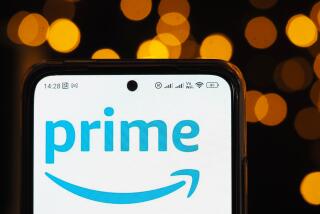IPOs Expected to Be Fewer but Bigger in 2001
- Share via
NEW YORK — Call it the Year of the Jumbo.
After a year when fledgling companies dominated the market for initial stock sales, 2001 promises a raft of large offerings from household names including Philip Morris Cos.’ Kraft Foods Inc. and Verizon Wireless.
Jumbo sales of about $50 billion--or half of last year’s record proceeds--are in the works, with the bulk comprising telecommunications companies from around the globe looking to raise money for acquisitions, expansion and new technology.
“These are benchmark deals and will set the tone” for the rest of the market, said David McMillan, director of capital markets at Lazard Freres & Co.
For Goldman, Sachs & Co., Merrill Lynch & Co. and other top underwriters, the mammoth offerings stand to buttress underwriting revenue at a time when bankers expect fewer initial public offerings. They’ve already lined up more than 10 initial sales worth at least $3 billion each, compared with just five last year.
Underwriting fees fell in the second half of 2000 as investors snubbed the plethora of young technology IPOs they’d embraced in the months before the Nasdaq composite index tumbled. The Nasdaq slumped 50% since March, resulting in an average 18% loss from IPOs last year.
Although stocks have regained some ground from their lows of last year, many investors are still sitting on losses, making any IPO a tough sell.
“We expect this year to be more rational, a smaller number than last year,” said Bill Brady, head of equities in Credit Suisse First Boston’s technology group, which took 72 companies public last year, more than any other firm.
Though about 120 IPOs are tentatively scheduled for the first quarter, many are small technology companies that won’t be able to complete sales, bankers said.
So far this year, more than 10 companies have withdrawn their IPO plans, and no IPOs are scheduled until next week, when Deutsche Banc Alex. Brown is slated to bring Align Technology Inc.’s $160-million sale and UBS Warburg plans to complete Xenogen Corp.’s $84-million offering.
Telecommunications companies planning big IPOs include Verizon Wireless Inc. and Cingular Wireless, the top two U.S. mobile-phone companies, as well as China Telecommunications Corp. and Taiwan’s Chunghwa Telecom Co. Deutsche Telekom and Royal KPN are also expected to sell shares in their wireless businesses this year.
France Telecom’s $6.7-billion IPO of its Orange wireless unit will be the first of the telecommunications firms when it begins selling later this month.
“There are some large international telecom deals about to be launched, and the market is waiting with bated breath,” said McMillan at Lazard Freres.
Outside of that industry, food, beverage and tobacco giant Philip Morris is planning a partial sale of its Kraft Foods unit through Credit Suisse First Boston and Salomon Smith Barney Inc. That may end up eclipsing AT&T; Wireless Group’s record $10.6-billion sale last April. Lucent Technologies Inc. is planning a part sale of its Agere Systems Inc. microelectronics unit, which could reap $8 billion or more, through Morgan Stanley.
Orange, which plans its sale in mid-February, will set the tone for the rest of the offerings, investors and bankers said. If the issue doesn’t drum up support from buyers, it might force others to hold off their plans. Orange’s sale already has been sliced in half, and France Telecom added an exchangeable bond to the sale as it struggles to find enough investors willing to buy the stock.
The most recent large wireless IPO, AT&T; Wireless Group, hasn’t fared well. The shares closed below their IPO price on all but eight days since they were sold for $29.50 each April 26. They closed Friday at $24.69, down 15% from the IPO price.
Other comparable stocks have fallen even more. Sprint Corp. and Nextel Communications Inc. have lost more than half their value in six months.
Verizon, planning a $5-billion IPO, and Nextel Partners Inc., slated to raise $810 million, already have delayed their sales, initially planned for last year, and haven’t set a new date.
The expected sales don’t include likely secondary share sales from companies that are already public.
Notwithstanding their price drops, Sprint and Nextel International might seek to sell more shares this year, investors said. Japan’s NTT DoCoMo Inc., the world’s No. 2 cell-phone company, plans to sell as much as $6.8 billion of new shares next month.
“There’s a lot of paper coming out in the wireless area,” said Bill Turner, telecommunications analyst at Banc One Investment Advisors Inc.
Still, with relatively few wireless investments to choose from--AT&T; Wireless, Sprint, Nextel and Vodafone being the main large companies--investors are keen for more, Turner said.
“There’s not that much out there to choose from,” said Turner, who said he’s likely to invest in many of the sales by U.S. wireless companies. “I think it will get absorbed.”
More to Read
Inside the business of entertainment
The Wide Shot brings you news, analysis and insights on everything from streaming wars to production — and what it all means for the future.
You may occasionally receive promotional content from the Los Angeles Times.










